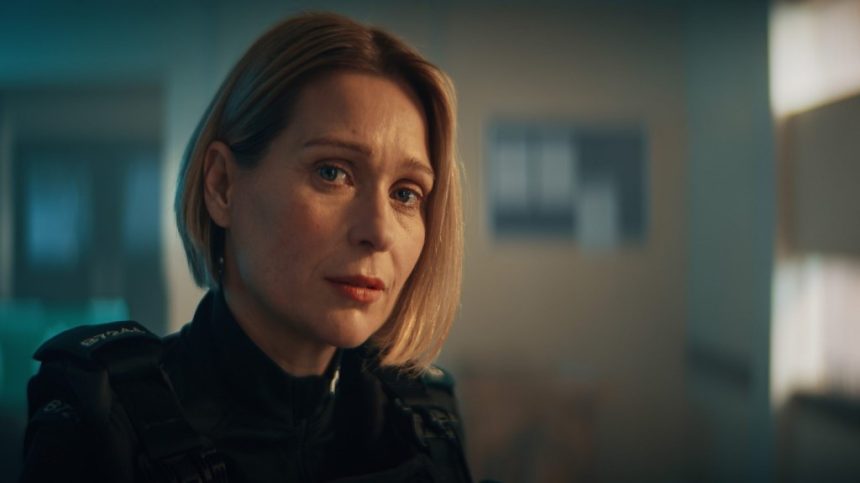Siân Brooke is back on U.K. screens this week as Grace Ellis in the BBC‘s Belfast, Northern Ireland-based police drama Blue Lights season 2.
Blue Lights, about three probationary police officers in the Police Service of Northern Ireland struggling with the general pressures of the job and crime and tensions in Belfast, has become a hit show for the BBC, which has already ordered seasons 3 and 4. One of the new officers is Brooke’s Grace, a single mother in her 40s who left her job as a social worker to join the police but must soon wonder if she’s made the right decision.
Season 2 debuted on BBC One on Monday night London time, airing weekly, with all episodes now already available on streaming service BBC iPlayer. The show is also available internationally on streamer BritBox International. The season 2 trailer (see below) highlights tensions and new challenges for the police officers.
In addition to Blue Lights, Brooke has also graced TV screens in such roles as Aemma Arryn in HBO hit series House of the Dragon, Karen on Apple TV+ show Trying with Rafe Spall, and Sherlock Holmes’ sister Eurus opposite Benedict Cumberbatch in BBC drama Sherlock. With the latter, she starred on a London stage in Hamlet as part of her theater career. And in film, she has been seen in Marie Curie biographical drama Radioactive, starring Rosamund Pike. This summer, she will be in the Netflix superhero series Supacell.
The Hollywood Reporter talked to Brooke about the challenges of portraying a rookie cop in Blue Lights, the range of roles she has played across TV, film and theater, her thoughts on AI and what is next for her.
How difficult or easy was it for you to get into the role of Grace who is, like you, a mother but also a cop with a very challenging job?
I have to credit the writers really. We have phenomenal writers. Especially with this script, I just thought that it was quite magical in the way that they had made a world, which I didn’t know brilliantly, so accessible because of their writing. It is not just my character, but so many characters who are so identifiable. I have spoken to people not just in the U.K., but around the world who say: “I know someone like that who lives in my area” or “I’ve worked with someone like that.”
So, I have to credit the writers for Grace in that a lot was in there. When I read the script, I had a feeling I know who this person is. That doesn’t always happen. There is no quantifiable sort of mathematics or whatever, but there’s a bit of that feeling about this person. Then, you obviously bring into that people or elements of people you might have met or know, and you put them all into that big mixing bowl and then hope for the best.
The greatest thing about her is her abundance of empathy. Grace is somebody who wants to make things better for other people. It’s such a wonderful thing. This person is on this path of the greater good, and in a selfless way. I’ve played many different roles over the years, but she’s quite unique in that, and she won’t back down. She doesn’t learn lessons from it, she sort of gets herself into a whole heap of trouble, sometimes.
Seeing a character like that on-screen feels refreshing at a time when you hear many people saying that they look at the news and struggle with the state of the world.
I’m glad you said that. This show came about in COVID times. When that whirlwind arrived, I had a meeting with the director over Zoom, and five minutes before I had this meeting, I did a test and it came up that I got COVID.
Those people in the public eye seem to be few and far between, these people who are just trying genuinely to do their best with a really strong moral compass. And that’s what Grace is trying to do. I think that’s what many of the police officers that they have written do. These are ordinary individuals just trying to do their damn best to sort of make things a bit better.
Is it fun or challenging to portray the layers that Grace and her colleagues have to them? Like you said, they are not always doing the right thing and getting credit, and they are all vulnerable in different ways.
That’s what I love about her. She is messy. She’s trying to do the right thing. And if people are going to put themselves on the front line, they’re going to fall on the booby traps, and they’re going to get hurt. If you are genuinely trying to change things, you’re going to get hurt in some way, or you’re going to say the wrong thing. We’re all human beings, and we all mess up now and again. Those are the most interesting characters to play. You don’t get somebody who’s just strong but somebody who’s strong because of the victim they might have been at some point in their life. It’s a consequence of something. So I always think there’s more to a character than just being strong or being determined, there has to be something behind it that makes them more human.
‘Blue Lights’ with Martin McCann (as Stevie Neil), Siân Brooke (as Grace Ellis), Katherine Devlin (as Annie Conlon), and Nathan Braniff (as Tommy Foster).
BBC/Two Cities Television/Todd Antony
What are some of the key challenges that Grace faces in this second season launching this week
In season 1, she’s sort of wide-eyed and trying to find a way and also is quite dogged in her approach – “I’m going to make it better.” She is slightly naive in terms of what she might be able to achieve.
This time around, we’re a year on, and like a year on with any job, you have a greater understanding of your capabilities and where to put your energy. So, now we find her slightly more hardened by this job, which I think is inevitable with a job where you’re always putting yourself out there and in dangerous situations. It’s a relentless job. Also, her son has left for university, and I think she gets a lot of solace in being a parent and a lot of confirmation of who she is in being a single parent, and he’s not there. So that impacts quite a bit who she is and what’s her cause. It’s the empty nest syndrome of “gosh, all my focus has been on this person, and now they’re not there.” So that’s interesting.
And then we have the sort of friendship with Stevie, this “will they, won’t they, do they, don’t they?” At this point, I think they’ve decided that in this job they’ve got to let their heads rule their hearts and remain as friends, and basically discover whether they are any good at that or not.
While I was watching season 1, I caught myself reading up in between episodes on Northern Ireland policing detail and history. You said you weren’t brilliantly familiar with all this. What helped you dive into this world?
The same as you. I was as not as knowing about policing in Northern Ireland as I am now. I think we all have a notion of what we think Northern Ireland is, or Belfast, and what we’re presented in the news and media and stuff like that. There’s nothing like actually being in a place, there’s nothing like spending time there, there’s nothing like working there.
I find that I can visit somewhere, but if I work there for a period of time, you really get to know the dynamics and the people that make the place, especially, for me, Belfast. It’s one of the most enjoyable parts of the job for me. In terms of history, when I was at school, I wasn’t the greatest student, but now I love it. So, I delve into it and throw myself into the research, read articles and watch documentaries.
And we had amazing police advisors with us on set, so I could chat with them extensively and went on ride-alongs in the back of their car during their shift. They said, sadly, it wasn’t the most eventful night for them – come back on a Friday night. But I found it so interesting. When do you get to do that unless you’re under arrest? I always think, especially when something is so firmly rooted in a location or a specific job or occupation, that the more I can soak up, the more I have to play with at any given point.
Blue Lights was a new show that found its audience, but you’ve also worked on big franchises, such as Sherlock and House of the Dragon that come with viewer awareness and expectations. How different is it to work on those big franchises and what pressures do they come with?
To say that you don’t feel any pressure when you join these huge franchises, it would be a lie. Because you can’t delete what went before. You have to honor that. With House of the Dragon and Sherlock, I would have been living in a cave if I’d said I didn’t know about the shows. With Sherlock, I was a huge fan before the possibility of joining that show. So, there is a sense of pressure. But I think you can’t really listen to that because otherwise it dictates what you do and the choices you make as an actor.
When you simplify what you do as as an actor, it’s, well, I create a character to tell a story. That’s the essence of every job, whether it’s House of the Dragon or Blue Lights. But with [a new show], you are creating this world as well. That’s always unique and special, because the canvas is blank. That’s always special and terrifying.
I heard you also worked on this upcoming Netflix show Supacell. Anything you can tell me about the series and your character and any other upcoming projects?
Supacell is this incredible show, which was created and written by this amazing man called Rapman, whose vision is phenomenal. It’s so infectious to hear where he wants to take it. I remember meeting with him, and he said this is the show, and this is the premise, and this is what I want to do. And I was like, wow, this is special. It’s set very firmly in South London, which was always a bonus because I live south of the river (Thames). It’s about these characters who realize they have superpowers, and the only similarity between them is that they’re all Black. It’s quite an epic piece. I play a character who runs a hospital which is quite cool, but quite different again, which is a joy. So that’ll be coming out on Netflix.

Siân Brooke
Courtesy of David Reiss
And then I got a show that is very dear to my heart, which I’ve done three season of now, which is called Trying (on Apple TV+). The fourth one is going to come out soon, which I absolutely love. It’s like soul food for me.
Your character Karen on Trying is also different again, right?
Her empathy level is dialed down in terms of the comparison between her and Grace (on Blue Lights). She is probably on a level four or level three, while Grace is an 11. I love playing Karen because she’s so irritating. When do you get to play characters that are so unlikable sometimes?! She says all the things that you’ll never get away with actually saying in real life.
Also, it’s nice to play in a Midlands accent [spoken in the central part of England] again, which is my own accent, because for a long time that never happened. Coming into my 40s now, I think a bit more, “yeah, that’s where I’m from, and I’m quite proud of my Midlands twang.”
Your husband Bill Buckhurst is a theater and film director and also an actor. Have you ever worked with him on a project?
It’s really funny. People would always ask me, “Will you ever work with your husband?” And I said: “No, never. I will never let him tell me what to do as a director, blah, blah, blah.” And then he directed a film called Pond Life. It is a beautiful coming-of-age film about these kids in Doncaster. And he just said, “Would you come in and just play one of the mums, there’s just a couple of days filming.” I was quite reticent and not sure. I felt quite nervous about doing that.
And actually, it was the best experience. It was the most amazing experience, because if you trust someone, creatively the world’s your oyster. Obviously, there’s trust there. And so whatever he said, I felt, “Totally, I can do that.” So it’s taken a long time, but we’re developing a script at the moment.
There has been a lot of debate about the use of AI and other technologies in the creative industries. How do you think about technology and whether it is a helpful tool or a threat?
I think we have to be very careful about it. And the more power we have, the more we can’t put our heads in the sand about it. We need to know more about it, so that we can use it to our advantage when we need to and not let it overwhelm. Creatively, I think it’s a very scary road to tread in a way, because the human brain is such an incredible, wonderful playground for creation. As an actor, it saddens me that you might get replaced, because I don’t think you could possibly replace the human brain or what a human being has to offer. And also when human beings get together – actors, writers – that collaboration, I just don’t think you can recreate that.
Anything else you’d like to share?
Coming back to Grace and this character. I think sometimes we forget that most people are good. It is just that those who aren’t sometimes get the biggest platform. And I think that’s what Blue Lights tries to highlight – these ordinary people in these extraordinary situations. In today’s world, we sometimes have to hang on to that and maybe highlight that a bit more and maybe let that carry us forward. It’s a show that does have hope at its heart.











